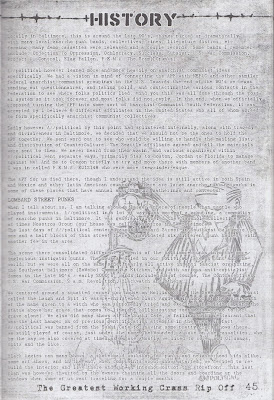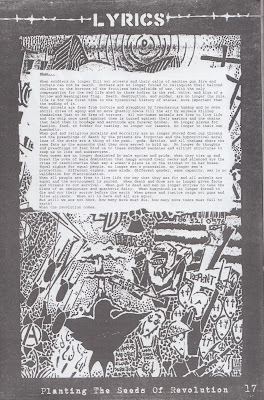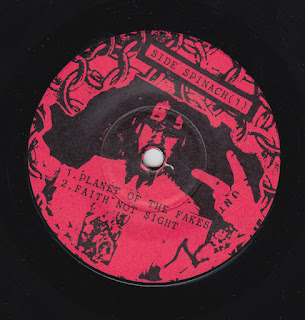Of course, Aus-Rotten and Antiproduct quickly came into the picture as well, but, as I was lying ungracefully on my (one) comfy chair, immersed in my thoughts, chain-smoking myself to death and enjoying my fifth cup of coffee, A//Political were royally seated at the top of my list. Arguably, many would claim that they were never quite as accomplished a band as the five other anarchopunk bands I wrote about but they probably are my favourite of the bunch. A//Political reeked of anarchopunk on all levels and to some extent, they could be seen as the ultimate 90's anarchopunk band. On its very face, it is a bizarre statement perhaps, but looking closely at the band's existence, stance and outputs, a relevant one nonetheless. Like Aus-Rotten, Mankind?, Civil Disobedience, Brother Inferior and Antiproduct, the music of A//Political has been seldom discussed, as if the political nature of the band made a critical, analytical look at their actual work pointless or irrelevant. As I remember it, A//Political, for their acerb lyrics, were quite polemical and the term "PC" was often thrown when they were mentioned, although more out of intellectual laziness and denial than anything else. But then, I suppose that this has always happened whenever a band is critical of the punk scene and the song "Punk is dead", almost 40 years after it was written, is amazingly still misunderstood and a stable point of contention in some quarters.
In 2010, a wonderful discography of the band, wittily entitled "The greatest working Crass rip-off", was released jointly by three labels, Threat To Existence (run by someone from Against//Empire if I am correct), Rabid Records and Hell On Earth Records. Although I do prefer vinyls (yes, you may yell "neeeeeeeeeeerd"), I am also a rather pragmatic geezer and I noticed that the cd version of the discography, contrary to the vinyl one, included the 1997 demo so I bought the cd. The booklet that comes with the record is amazing, one of the best I have ever seen: 60 pages with all the lyrics, the history of the band, loads of flyers and artwork, pictures, interviews... It is clear that a lot of time and effort have been put in this and I wish all retrospective records demonstrated this level of passion, commitment and respect. If we do see punk as a valid and legitimate culture (or counterculture if you like), then it might be a good idea to deal with our cultural artifacts in a serious manner, to allow the actors to tell their story and to deliver decent-looking discographies. It is true that a band like A//Political, because of their aesthetics and their highly political dimension is adequate for such a project, but then all the bands have stories to share, old pictures or flyers. So when I see a vinyl discography without even a lyrics sheet, not only do I feel like a fool who just spent 12 euros for - literally - just the plastic record but it also feels like a tremendous lost opportunity to take part in the multi-faceted telling of punk's history. And it is a fucking shame.
But back to A//Political. Since I am a sweetheart, I scanned the band's history written by Angel (the guitar player). I see little point in retelling all of it and I strongly recommend you read it (you know, for posterity's sake and all that). A//Political (or rather A-Political as they spelt it then) started sometime in the mid-90's in Baltimore after the demise of another local band, Coexist. Apparently, the band stagnated for a while, knew a number of line-up changes but eventually stabilized in 1996 with an almost totally different crew which prompted them to change their name drastically: they became A//Political. The existence of the band was tied to that of the Crasshole Collective (they certainly loved their Crass-related puns!), a group of active people that strove to create a lively, committed, revolutionary anarchopunk scene in deprived Baltimore. This led to the creation of Crasshole Records and, a few years later, to the birth of the Anarcho Punk Federation that aimed at promoting an international anarchopunk network.
The political, revolutionary even, element that was inherent in A//Political is one aspect that certainly relates them to bands like Crass, The Apostles or Conflict that had a serious political agenda and strove to organize and develop a radical punk scene. Basically, A//P were not just applying the anarcho ethos to their band, but they endeavoured to spread them to their local scene and connect with like-minded people all over the world, they also put on fund-raisers for radical organizations and invited political speakers at their gigs. This was genuinely "act locally, think globally" and while I am aware that a lot of us love to act all jaded in 2016, full of our internet-fueled sarcasm and lazy cynicism, for all their idealism and naivety, A//P remains a band that actually believed in what they preached and were absolutely unapologetic and confrontational about it, as their communiqués (they did take themselves seriously, a tad cheesy maybe but I don't mind) inspired by anarchism and situationism show with topics ranging from prisons, revolutionary violence or the nuclear family. Thought-provoking stuff that definitely stood out among the 90's anarchopunk production. You may disagree with it but it is irrefutable that they lived and breathed by the anarchopunk philosophy.
"Planting the seeds of revolution" is A//Political's first demo and it was recorded in early 1997. I actually have a copy of it on tape, although it is more accurately a second generation copy (at least) that I got from Catchphraze records in 2003. There was a thick booklet that came with the original demo but it was not provided with my copy. On the tape, the sound is quite rough but it gives it a certain charm as I have the impression to listen to a great demo that has been rightly overplayed. But for clarity's sake, I have also included rips of the demo taken from the discography cd so that you can have a clear idea of what is actually going on. When I say that A//Political were the ultimate anarcho band, it was not only for their uncompromising stance, it was also about the music. The demo is an anarchopunk feast that relies heavily on referentiality but still manages to sound fresh and spontaneous in the context of 90's anarchopunk. Of course, A//P were not the only players in town in terms of overt influences and a band like Aus-Rotten, for instance, did not try to hide that they were trying to blend Conflict with Discharge via Final Conflict. But A//P were the only band at the time to blatantly use the sonorities of vintage UK anarchopunk to such an extent. The only other band that could come close on that level would be Resist And Exist in their early years, back when they penned these delicious Chumbawambesque songs. For that reason, A//P must have been a bit of an oddity at the time, because open referentiality (or geeky fanservice as it is known nowadays) was not really a thing in the 90's and the D-Beat wave was more an exception that was sometimes frowned upon rather than the rule. However, even if A//P wore their influences proudly and openly, the way they adapted them to their music is unlike 2000's bands who often used "cool" references for the sake of paying a tribute. It feels like A//P's referentiality is spontaneous and just a heartfelt means to write songs they would themselves listen to in order to spread their ideas - which was always the core principle of the band - a means to an end rather than the end itself.
From my personal perspective, A//Political is a dream of a band that took inspiration from the original anarchopunk scene in terms of politics and ideals as much as music. The demo is replete with passionate spoken parts, tribal drum-beats, multivocal arrangements, catchy guitar leads, fast'n'snotty cider-fueled moments... It synthesizes 80's anarchopunk while keeping a genuine political motivation and a sense of context. Incredibly referential but superbly relevant in their present if you like. A//P's music took the ominous tribal rhythms of Crass, Anthrax and Flux, the ragingly fast quality of early Antisect, Legion of Parasites or Dirge (although it is unlikely they had heard of Dirge at the time), the intense and epic sense of orchestration of Conflict, the punky and sloppy "putaputaputa" vibe of UK82 bands like Disorder or Social Disease and the textures of SoCal anarcho bands like Media Children and Resist And Exist. The production on the demo is raw, for real, but it actually reinforces the sense of urgency and outrage of the music, it punkifies it. The youthful, pissed off vocals, reminiscent of Flux, Pete Boyce and Iconoclast's, are to die for and the way they flow points as much to vintage 80's UK punk as the PDX anarchopunk sound of Defiance or Deprived or even the infamous "streetpunk" wave. The riffs are simple, not perfectly executed to be fair, but played with energy and conviction. I love everything about that demo, it offers a great collection of songs that demonstrate a compelling range of different paces and moods but display a strong sense of cohesion, even more emphasized by the fact that there is no pause between some of the songs. "Planting the seeds of revolution" is also a great work because it is accessible, the music is very catchy and anthemic and, despite its obvious references, you do not need to be a punk encyclopedia to enjoy every second of it.
In accordance with the band's ideals there wouldn't be much point in raving about A//Political and not talk about the lyrics (the scans come from the discography). As Angel points out in the band's history: "We took a quality from all those bands from the 80's we tried so hard to emulate that so many other bands who tried the same really just glossed over. That of irony and sarcasm". That is key if you want to really appreciate the band's lyrics and understand why they stirred up so many arguments. Although some of their words were more akin to "traditional" confrontational anarchopunk rants about the state being the upper-classes' oppressive tool to control, punish and indoctrinate us all, others were directed at the global punk scene. The song "Stop thinking and pogo" was a harsh, but relevant, critique of the popular streetpunk fashion that was superficial and devoid of meaning and it mentioned The Casualties (who, I think, replied with the poorly-written song "For the punx" that basically confirmed everything A//P criticized them for...); "Obscene gestures" focused on the pathetic behaviours that "da punx" could display in terms of sexism, homophobia or pathetic rockstars attitudes; "Everything is a front" targeted famous bands that had signed on a major label but still tried to sell the idea of a revolution (RATM? Chumba?)... Controversial lyrics that, at least, aimed at making punks think and getting them out of their comfort zone. And let's face it, we need bands like A//Political.
You may scoff at their revolutionary romanticism or find their determination deluded ("Fight back or fuck off"), but I will take that any day over a pseudo-nihilistic, directionless hardcore band with vague songs about nothing disguises as "personal lyrics". Besides, they directly refer to Antisect in the title of the song "Education is indoctrination" so I am officially and indefinitely biased. And come on, how can you not like their great-looking, Apocalypse-like logo?


















































